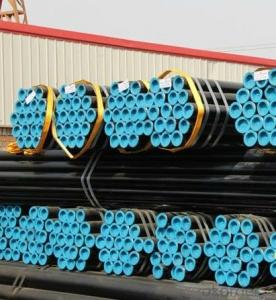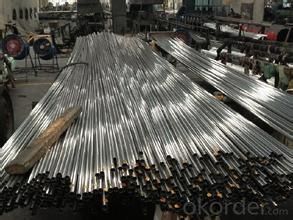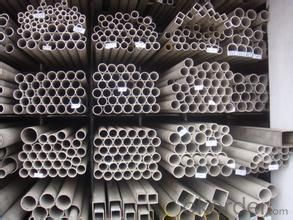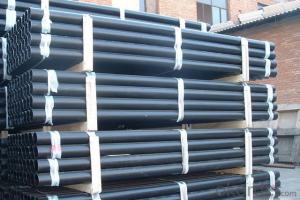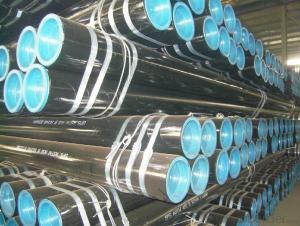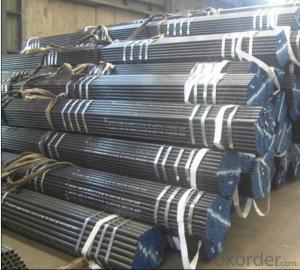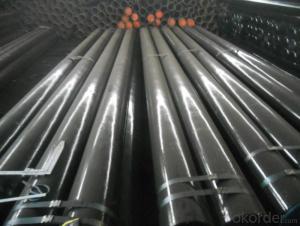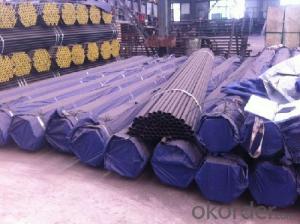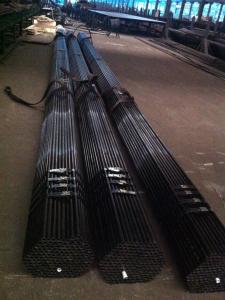ASTM A106B Seamless Steel Pipe
- Loading Port:
- China Main Port
- Payment Terms:
- TT or LC
- Min Order Qty:
- -
- Supply Capability:
- -
OKorder Service Pledge
OKorder Financial Service
You Might Also Like
Quick Details
| Thickness: | 4 - 100 mm | Section Shape: | Round | Outer Diameter: | 27 - 508 mm |
| Place of Origin: | Shandong China (Mainland) | Secondary Or Not: | Non-secondary | Application: | Structure Pipe |
| Technique: | Hot Rolled | Certification: | API | Surface Treatment: | Black painted or oiled |
| Special Pipe: | Thick Wall Pipe | Alloy Or Not: | Non-alloy | ||
| OD: | 1/2"-22" | Length: | 5-12m | Certificates: | ISO&API |
| Grade: | 20#,16Mn,A53(A,B),A106(B,C),St37,St52,St42,St35.8,10#-45#,A53-A369,ST35-ST52 | Standard: | GB/T 8162-1999,DIN 1629/3,ASTM A106-2006,GB,DIN,ASTM |
Packaging & Delivery
| Packaging Detail: | wrapped in bundles with steel strips |
| Delivery Detail: | 30days |
Specifications
1, We manufacture steel pipes
2, Main market: Asia, South America
3, Advantage: Medium and Thick wall pipe
4, High quaility
ASTM A106B Seamless Steel Pipe Image
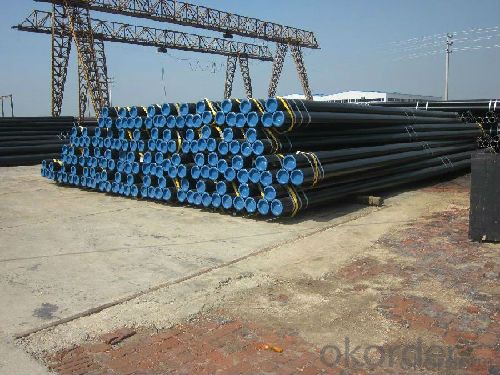
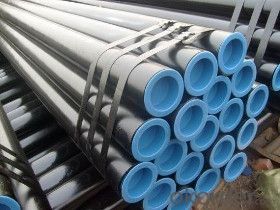
FAQ of ASTM A106B Seamless Steel Pipe
①How is the quality of your products?
Our products are manufactured strictly according to national and internaional standard, and we take a test
on every pipe before delivered out. If you want see our quality certifications and all kinds of testing report, please just ask us for it.
Guaranteed: If products’ quality don’t accord to discription as we give or the promise before you place order, we promise 100% refund.
②How about price?
Yes, we are factory and be able to give you lowest price below market one, and we have a policy that “ for saving time and absolutely honest business attitude, we quote as lowest as possible for any customer, and discount can be given according to quantity”,if you like bargain and factory price is not low enough as you think, just don’t waste your time.Please trust the quotation we would give you, it is professional one.
③Why should you chose us?
Chose happens because of quality, then price, We can give you both.Additionally, we can also offer professional products inquiry, products knowledge train(for agents), smooth goods delivery, exellent customer solution proposals.Our service formula: good quality+good price+good service=customer’s trust
SGS test is available, customer inspection before shipping is welcome, third party inspection is no problem.
Any question, pls feel free to contact us !
- Q: How do you prevent steel pipes from rusting?
- Various measures can be taken to prevent the rusting of steel pipes. One effective method is the application of a protective coating on the surface of the pipes. Different types of coatings, such as paint, epoxy, or zinc, can be used for this purpose. These coatings act as a barrier between the steel and the corrosive environment, thereby preventing direct contact between moisture, oxygen, and the metal, which can lead to rust formation. Another approach involves the use of corrosion inhibitors. These substances are added to the water or fluid flowing through the pipes, creating a protective film on the surface of the steel. This film acts as a shield, inhibiting the corrosion process and preventing the formation of rust. Regular maintenance plays a crucial role in preventing rust on steel pipes. It is essential to inspect the pipes regularly for any signs of damage or corrosion and promptly repair or replace any compromised areas. Additionally, keeping the pipes clean and dry by removing accumulated dirt or moisture helps prevent the formation of rust. In some cases, using stainless steel pipes instead of regular steel can be beneficial. Stainless steel contains chromium, which forms a passive oxide layer on the metal's surface. This layer acts as a natural barrier against corrosion, making stainless steel pipes highly resistant to rust. Finally, controlling the installation environment of the pipes can also help prevent rust. This can be achieved by maintaining proper ventilation, controlling humidity levels, and avoiding exposure to harsh chemicals or corrosive substances. By implementing these preventive measures, the lifespan and integrity of steel pipes can be significantly extended, while minimizing the risk of rust formation.
- Q: How are steel pipes used in the automotive exhaust system?
- Steel pipes are used in the automotive exhaust system to transport and expel the exhaust gases from the engine. They are durable and resistant to high temperatures, making them suitable for this purpose. Steel pipes are often bent and welded together to form the exhaust system, ensuring a smooth flow of exhaust gases and minimizing any leaks.
- Q: Can steel pipes be used in extremely cold temperatures?
- Indeed, steel pipes are capable of being utilized in frigid temperatures. Renowned for its robustness and endurance, steel proves itself suitable for a plethora of applications, even in the most extreme wintry conditions. Steel pipes exhibit a remarkable resistance to low temperatures, withstanding the detrimental effects of freezing without compromising their structural integrity. Consequently, they prove to be ideal for deployment in industries such as oil and gas, where they encounter sub-zero environments. Moreover, the option to insulate or coat steel pipes further fortifies them against the cold, preemptively averting issues like freezing or cracking. In summary, steel pipes unquestionably represent a trustworthy choice for deployment in exceedingly cold temperatures.
- Q: What are the different methods of coating steel pipes for insulation?
- Insulating steel pipes can be achieved through various methods, each with its own pros and cons. 1. One method involves applying a layer of thermal insulation material, like mineral wool or foam, onto the steel pipes. This helps minimize heat transfer and energy loss. While these coatings are easy to apply and offer excellent insulation properties, they are prone to degradation over time and require regular maintenance and replacement. 2. Another approach is to coat the steel pipes with materials that protect against corrosion, such as epoxy or polyethylene. These coatings act as a barrier, shielding the pipes from moisture, chemicals, and other corrosive elements. They are durable and long-lasting, providing effective protection. However, they may not offer significant thermal insulation. 3. Fusion-bonded epoxy (FBE) coating is a popular method that combines both insulation and corrosion protection. It involves applying a layer of epoxy powder to the pipes and heating it to create a strong bond. FBE coatings offer excellent adhesion, corrosion resistance, and some thermal insulation properties. They are commonly used in oil and gas pipelines, enduring harsh environments and high temperatures. 4. Polyurethane foam is often used as an insulation coating for steel pipes. It is applied by spraying or injecting the foam onto the pipe surface, where it expands and hardens, forming a protective layer. Polyurethane foam coatings provide exceptional thermal insulation and can be applied to pipes of different shapes and sizes. However, they require specialized equipment and expertise and may be susceptible to physical damage or moisture absorption if not properly sealed. 5. Ceramic coatings offer yet another option for insulating steel pipes. These coatings are typically applied through a thermal spray process, creating a layer of ceramic material on the pipe surface. Ceramic coatings provide insulation against high temperatures, corrosion resistance, and thermal shock protection. They are commonly used in industries like power generation and aerospace, where extreme temperature conditions are present. However, ceramic coatings can be costly and require specialized equipment and expertise for application.
- Q: How do steel pipes handle soil movement?
- Steel pipes are able to handle soil movement quite well due to their inherent strength and durability. The rigid nature of steel pipes allows them to withstand ground shifting, settling, and other soil movements without significant deformation or damage. Additionally, steel pipes can be reinforced with additional supports and anchoring systems to further enhance their ability to handle soil movement.
- Q: What are the different types of steel pipe fittings for plumbing systems?
- There are several different types of steel pipe fittings for plumbing systems, including elbows, tees, couplings, unions, reducers, and flanges.
- Q: What is the difference between steel pipes and cast iron pipes?
- The main difference between steel pipes and cast iron pipes is the material they are made of. Steel pipes are made from an alloy of iron and carbon, making them stronger and more durable. On the other hand, cast iron pipes are made solely from iron, which makes them more brittle and prone to cracks. Additionally, steel pipes have a smoother interior surface, allowing for better water flow and reducing the chance of clogs. Cast iron pipes, on the other hand, have a rougher interior surface and are more susceptible to corrosion. Overall, steel pipes are typically preferred for their strength and longevity, while cast iron pipes may be used in specific applications where their unique properties are advantageous.
- Q: Can steel pipes be used for underground air supply systems?
- Yes, steel pipes can be used for underground air supply systems. Steel pipes are often used in underground applications due to their strength, durability, and resistance to external factors such as corrosion and impact. They can withstand the pressure and temperature requirements of air supply systems and can be easily installed underground. Additionally, steel pipes have a long lifespan, making them a cost-effective choice for underground air supply systems. However, it is important to consider factors such as soil conditions, potential for corrosion, and local regulations when selecting the appropriate steel pipes for the specific underground air supply system.
- Q: Can steel pipes be used for high-temperature applications?
- Yes, steel pipes can be used for high-temperature applications. Steel is a durable and robust material that can withstand high temperatures without deformation or structural failure. It has excellent heat resistance properties, making it suitable for various industrial processes, such as steam lines, power plants, and oil refineries, where high temperatures are involved. The use of specifically designed high-temperature steel alloys further enhances their performance in extreme heat conditions.
- Q: How do you measure the diameter of a steel pipe?
- To measure the diameter of a steel pipe, you can use a few different methods depending on the available tools and accuracy required. Here are a few common ways to measure the diameter: 1. Calipers: The most accurate method is to use a set of calipers. Open the calipers to their maximum width and then gently close them around the pipe until they fit snugly. The measurement shown on the calipers will be the diameter of the pipe. 2. Tape measure or ruler: If you don't have calipers, you can use a tape measure or ruler. Wrap the tape measure or ruler around the circumference of the pipe, making sure it is snug but not too tight. Divide the measurement by pi (3.14) to get the diameter. This method may not be as accurate as calipers, but it can give you a rough estimate. 3. String or flexible tape: Another option is to use a piece of string or flexible tape. Wrap the string or tape around the circumference of the pipe and mark where it overlaps. Measure the length of the marked section using a ruler or tape measure. Divide this measurement by pi (3.14) to determine the diameter. 4. Pipe gauge: A pipe gauge is a specialized tool designed specifically for measuring pipe diameter. It consists of a series of circular holes with corresponding diameter labels. Simply insert the pipe into the hole that best fits, and the label will indicate the diameter. Remember, it is essential to measure the diameter at multiple points along the pipe to account for any irregularities or inconsistencies. For accurate measurements, it is recommended to take multiple readings and calculate an average diameter.
Send your message to us
ASTM A106B Seamless Steel Pipe
- Loading Port:
- China Main Port
- Payment Terms:
- TT or LC
- Min Order Qty:
- -
- Supply Capability:
- -
OKorder Service Pledge
OKorder Financial Service
Similar products
Hot products
Hot Searches
Related keywords
